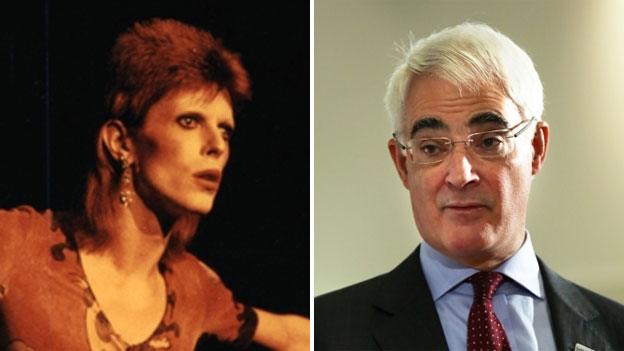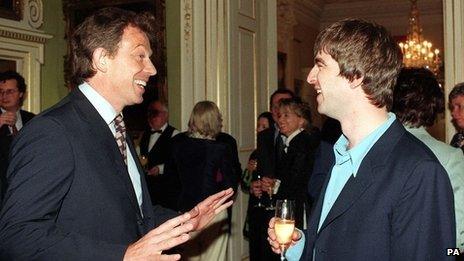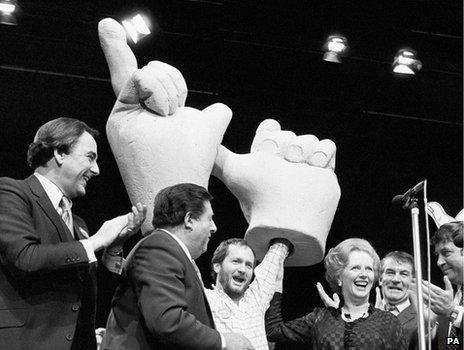Politicians' jamming with the stars is mainly a no-no
- Published

No doubt those campaigning against Scottish independence will be thrilled that Ziggy is on their side.
David Bowie's surprise support at the Brit Awards for keeping the UK together will delight the No team.
After all, what better way to add a bit of glitz and glamour to the rather dry, professorial eyebrows of Better Together campaign chief Alistair Darling than some megastar gold dust.
For when it comes to celebrities, politicians are bit like the proverbial moth to a flame.
They just can't resist flying too close and, in the end, getting well and truly burned.
Tony Blair was, of course, the arch-exponent of the celebrity endorsement.
Endorsements
His Cool Britannia reception in Downing Street in 1997 after he became prime minister was packed to the rafters with the young, hip and happening.
In government, Mr Blair soaked up the endorsements of celebrities in pretty much every field, ranging from Sir Alex Ferguson to Charlotte Church, from Vivienne Westwood to Noel Gallagher and sundry soap stars.

Tony Blair and Noel Gallagher getting along famously in 1997 - it wouldn't last
And yet in time most either deserted or turned against him.
Noel Gallagher, having hailed Mr Blair as Britain's very own JFK, later launched into him in language too colourful to repeat.
Let us just say one of his milder observations was that Mr Bair was no different to David Cameron.
Nick Clegg is the latest political leader to suffer from this sort of "celeb backlash".
Messy business
Daniel Radcliffe, aka Harry Potter, having initially backed the Liberal Democrat leader, recently derided him as the Tories' "whipping boy".
Actor Colin Firth, another Clegg backer, last month dismissed the deputy prime minister's record in government as "profoundly disillusioning".
The difficulty, one suspects, is that politics is a fairly messy business. It involves compromise and setbacks while many celebrities seem to think "sell-outs" happen only at their concerts.
And celebs themselves can prove a bit of a problem for politicians - unguided missiles prone to blow up at the wrong time in the wrong place.

Margaret Thatcher was all smiles after Kenny Everett's routine - but he wasn't invited back
Comedian Kenny Everett famously plunged Margaret Thatcher's Conservatives into anguished panic after telling a 1983 pre-election youth rally: "Let's bomb Russia!.... Let's kick Michael Foot's stick away!"
In 2009, Michael Caine, another Tory backer, caused a ripple of unease in Team Cameron when he launched into "three-and-a-half million layabouts laying about on benefits" at an event to promote Mr Cameron's plans for a youth "national service" scheme.
Rambling conversation
In 1991, the Green Party scored a publicity coup when it signed up David Icke - then best known as a late-night presenter of snooker on the BBC - as a celebrity supporter.
The party was mortified when shortly afterwards Mr Icke announced he was leaving because he had discovered he was the son of God. He was banned from speaking at Green meetings but continued to be referred to as a spokesman for them, much to their annoyance.
And it is not just in the UK that celebs can go a little off message.
In 2012, Hollywood icon Clint Eastwood left Republican activists squirming with embarrassment after he engaged in a long, rambling conversation with an empty chair (meant to be President Obama) at the party's national convention.
In short, maybe Mr Darling should be just a little careful of those Spiders from Mars.
- Published20 February 2014
- Published20 February 2014